

Researchers Warn of “Devastating Effects” From Changing Currents. An uninhabited rock island in Palau, Micronesia.Luxtonnerre, Planet Pix/ Zuma Let our journalists help you make sense of the noise: Subscribe to the Mother Jones Daily newsletter and get a recap of news that matters.
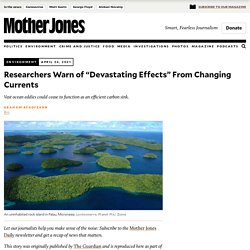
This story was originally published by The Guardian and is reproduced here as part of the Climate Desk collaboration. Swirling and meandering ocean currents that help shape the world’s climate have gone through a “global-scale reorganization” over the past three decades, according to new research. The amount of energy in these ocean currents, which can be from six to 62 miles across and are known as eddies, has increased, having as yet unknown affects on the ocean’s ability to lock-away carbon dioxide and heat from fossil fuel burning. One expert said the changes described in the research could affect the ability of the Southern Ocean, one of the world’s biggest natural carbon stores, to absorb CO2.
What is happening in the ocean? What is happening in the ocean?
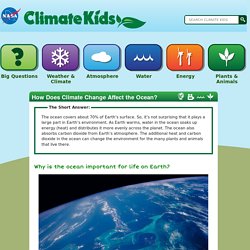
Why is the ocean important? Our watery world. After all, we live on land. But our world is a water world. The ocean covers 70% of Earth's surface. Climate change implications for New Zealand. 2016: New Zealand is being affected by climate change and impacts are set to increase in magnitude and extent over time.
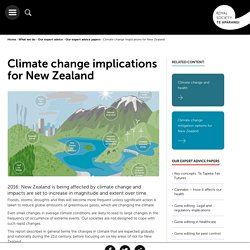
Floods, storms, droughts and fires will become more frequent unless significant action is taken to reduce global emissions of greenhouse gases, which are changing the climate. Even small changes in average climate conditions are likely to lead to large changes in the frequency of occurrence of extreme events. Our societies are not designed to cope with such rapid changes. This report describes in general terms the changes in climate that are expected globally and nationally during the 21st century, before focusing on six key areas of risk for New Zealand: coastal marginsflooding from riversavailability of and competition for freshwaterchanges to our surrounding oceansthreats to unique ecosystemsflow‑on effects from climate change impacts and responses overseas.
Penguins and Global Warming ☕ Climate Change Devastates Emperor Penguins □ In Antarctica. CO₂ concentration and global mean temperature 1958 - present. Planning pathways using climate change resources. This interactive groups Hub resources into key science and teaching concepts.
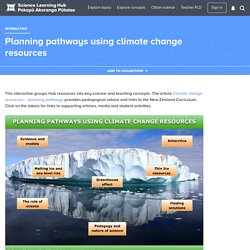
The article Climate change resources – planning pathways provides pedagogical advice and links to the New Zealand Curriculum. Click on the labels for links to supporting articles, media and student activities. This interactive diagram provides a selection of pathways that allow for differing approaches and starting points using some of our climate change resources. The aim is to assist educators with their planning of lessons and units of work by providing options that cover multiple science concepts. Background image courtesy of Christine Zenino, Creative Commons 2.0. Watch Free Documentaries Online. Before the Flood Official Trailer #1 (2016) Leonardo DiCaprio Documentary Movie HD. An Inconvenient Truth Trailer. The Atmosphere and Climate. Climate Change: What Happens If The World Warms Up By 2°C? Causes of global warming, facts and information. The average temperature of the Earth is rising at nearly twice the rate it was 50 years ago.
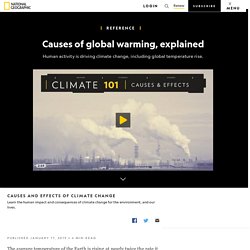
This rapid warming trend cannot be explained by natural cycles alone, scientists have concluded. The only way to explain the pattern is to include the effect of greenhouse gases (GHGs) emitted by humans. Current levels of the greenhouse gases carbon dioxide, methane, and nitrous oxide in our atmosphere are higher than at any point over the past 800,000 years, and their ability to trap heat is changing our climate in multiple ways. IPCC conclusions. A Brief History of Global Warming. NIWA heads to Antarctica for critical climate, ocean research. NIWA’s flagship research vessel Tangaroa leaves soon on a six-week voyage to Antarctica, making it one of the few full scientific expeditions to the continent since the global outbreak of COVID-19.
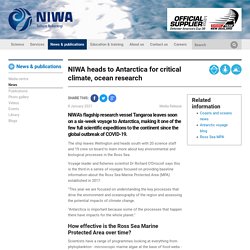
The ship leaves Wellington and heads south with 20 science staff and 19 crew on board to learn more about key environmental and biological processes in the Ross Sea. Voyage leader and fisheries scientist Dr Richard O’Driscoll says this is the third in a series of voyages focused on providing baseline information about the Ross Sea Marine Protected Area (MPA) established in 2017.
"This year we are focused on understanding the key processes that drive the environment and oceanography of the region and assessing the potential impacts of climate change. "Antarctica is important because some of the processes that happen there have impacts for the whole planet. " Warming ocean to alter ecosystems and affect fisheries by end of century, says NIWA scientists. Rapid warming of the ocean near Tasmania may provide a good indication of how the water around New Zealand will change as the planet warms, say NIWA scientists.
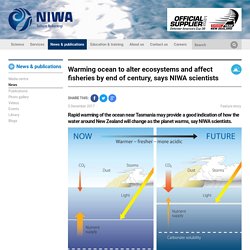
In a recent paper, published in the New Zealand Journal of Marine and Freshwater Research, the scientists have used two Earth System Models and four climate change scenarios to project how New Zealand waters will be affected by 2100. Lead author and NIWA marine biogeochemist Professor Cliff Law says the best-case scenario involved a cessation in the production of carbon dioxide in the next few years, with the worst-case being business as usual in which carbon dioxide levels keep rising. “The average warming around New Zealand is 2.5°C by the end of this century, which will affect how the ocean mixes and the nutrients available for plankton growth, with knock-on effects on the foodweb and fisheries.”
Climate change and health. Effects of climate change in Sub-Saharan Africa. Is climate change shrinking our fish?